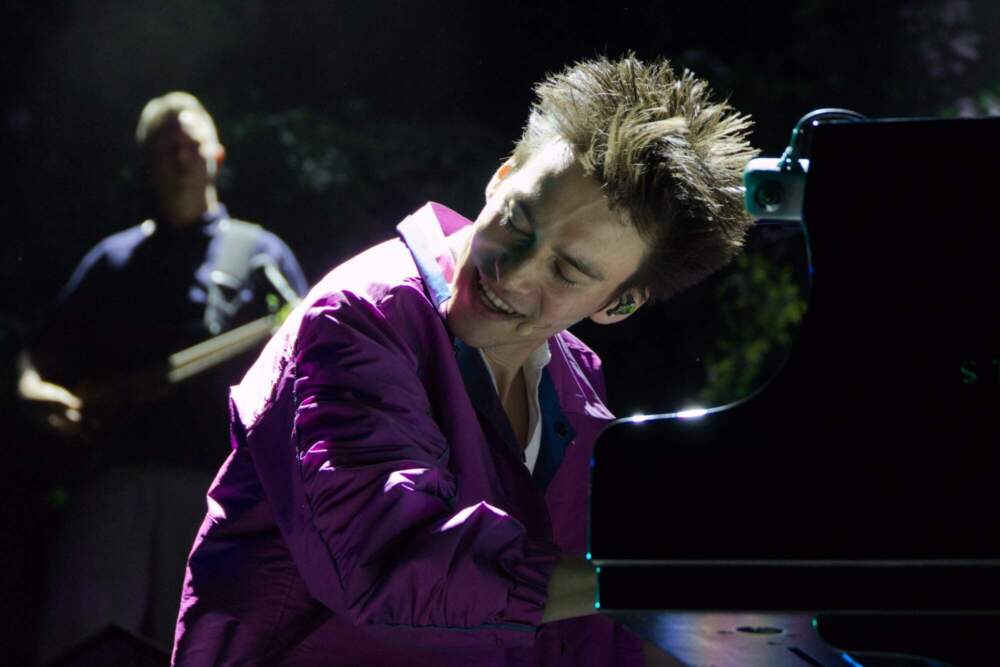Advertisement
Commentary
Jacob Collier and the joy of being a nerd

It’s April and I am in Trident Bookstore, surely one of only a few places in the world where you can eat a full plate of breakfast, buy a book, and enjoy both while sitting between a crew of middle schoolers doing homework and a group of 20-somethings — probably a band, instruments strewn about the floor — talking loudly about MF DOOM. It’s a wonderfully nerdy morning. I love it here.
I’d taken a bus from New York that morning to see Jacob Collier, who’s made a living off of making music that is exceptionally nerdy, play in Boston. The viral videos that helped launch his career show off his chops for complex vocal arranging, playing every instrument imaginable and using music theory concepts that you’d need a Berklee degree to explain. The DOOM disciples at Trident almost certainly listen to Collier, too.
Collier makes audacious music that isn’t always intuitive. You’d be hard-pressed to find anything to throw on at a party from his latest album, “Djesse Vol. 4,” which jumps between genres that would clash hard to most listeners, often in the same song. Skipping from classical to metal to reggaeton to raga, Collier, at 29, sounds like a kid who’s still just discovering every toy available to him.

No experiment is off the table, no contrast off limits. On past records, Collier’s songs have boldly asked the questions, “What if ‘Moon River’ had several hundred vocal parts?” or “What if we found a key between A major and B major, and put a chorus of Ty Dolla $igns over it?” Collier makes music for people who ask these kinds of questions, and want to hear their answers.
Or, to put it plainly, huge nerds.
I am, of course, one of them. I live in New York, the most mandatory of mandatory stops for touring artists of Collier’s status, but when I saw tickets for Radio City Music Hall, I passed. Instead, I did the same thing I did when Collier was last on tour — I texted my friend Alec, who directed my a capella group in college and now lives in Brookline. And I booked a bus north, to see Collier at the MGM Music Hall at Fenway, with people who feel like my own.
The first thing Collier does at a live show is conduct. The audience choir — an improvised exercise in which Collier motions to different sections of the audience to sing certain notes and syllables — is a big reason I’ve come. Videos of Collier’s audiences in different cities — Rome, Toronto and Singapore, for instance — have gone viral for the wonder of a crowd of strangers coming together and singing in seemingly perfect harmony, as if the thousands of them had all met up and practiced beforehand.
The theory goes that Collier can do this because his audiences are filled with singers, if not musicians in other rights, who have better ear training than the average fan. There’s an element of truth to this I think, but it misses a bigger story. The notes and harmonies Collier directs are quite simple, and most humans can follow them regardless of training. Bobby McFerrin, who directed audience choirs long before Collier, demonstrated this at the World Science Festival in 2008, making a chorus out of a crowd full of neuroscientists.
In Collier’s choir, you don’t need to be a musician. You could be a neuroscientist, or a barista, or none of these things. You don’t need to know much, you just need to know what sounds good to you, and to be brave enough to go for it, despite the risk of messing up, or sounding corny, and then try again until you find something worth sticking with. And then keep trying.
In other words, be a nerd. And at the Jacob Collier concert in Boston, there are loads. In the front row, I talk to a psychiatrist who met her husband in a band at med school. There’s an aerospace major at Northeastern who plays bari sax. They sing loudly, laugh hard and exchange looks that say How did he do that? I imagine each of them talking my ear off about something I know nothing about, that excitement the fruit of a life guided by curiosity. It’s the same simple excitement with which Collier approaches music.
Advertisement
I don’t mean to say Collier’s music is easy to understand. If someone would like to explain the super-ultra-hyper-mega-meta-Lydian scale to me, my inbox is open. But there’s a simple mindset behind it — that ideas are infinite, and we are not infinite, so why not explore as many as we can while we’re here?

There are things Collier makes that I don’t care for, like the screamo drop that brings “100,000 Voices” to a crashing end, or the Coldplay meets K-pop explosion of “Over You.” But I’m glad, to the highest degree, that he tries making these kinds of things work. Someone less curious wouldn’t have found the sublime dance between keys in the pre-chorus of “Little Blue,” or the tirelessly detailed arrangement of “Bridge Over Troubled Water.” We should all be so fearless, to dig so deeply into our passions, to try everything.
Toward the end of the show, Collier tells the audience that for the rest of the night, he doesn’t know what’s going to happen. But that’s a good thing, he says, to not know. It’s not a small claim for Collier — knowing things is kind of his thing, and he’s in a room full of people who know a lot, too. But to be nerdy isn’t so much to know things as it is to be excited about the possibilities that lie behind the things you don’t know.
At a concert hall in Boston, I’m in a room of people who get that. It’s their shared sense of wonder I’ve come here for. And as I walk out the doors and onto Fenway, it’s what I hope to take with me.
The next time I feel uncurious, when life has tricked me into settling for its walls of impossibility, I will think of this screaming, laughing room in Boston, and the boyish 29-year-old on stage saying, Come sing with us.
